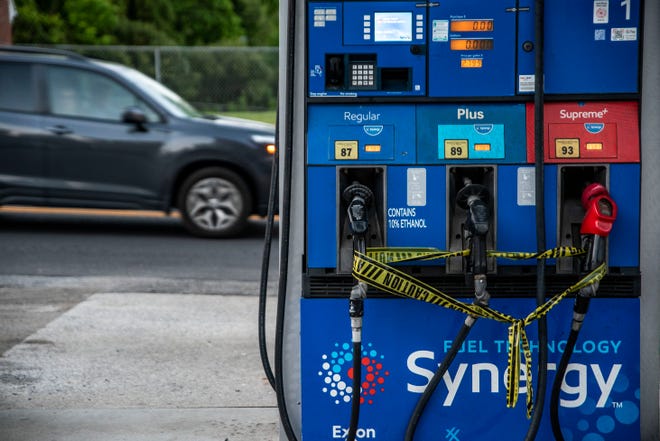Fact check: Post conflates pipeline hack and election fraud claims
The claim: Colonial Pipeline hack proves election infrastructure could have been hacked
Communities along the East Coast continue to face gas shortages after the Colonial Pipeline Co. fell victim to a cybersecurity attack.
Social media users are using the breach to resurrect unfounded claims about election fraud.
“If you can hack a pipeline, you can hack a voting machine,” claims a May 10 post.
Other accounts posted memes with the same claim. Examples of those posts are visible here and here.
Fact check:NRA claim overstates Biden’s remarks on gun control
These posts draw a misleading comparison between the Colonial Pipeline hack and unfounded allegations about hacked voting systems in the November 2020 election. Investigations around election infrastructure have repeatedly found no evidence of such interference in November.
USA TODAY reached out to the posters for comment.

Colonial Pipeline IT was hacked
When Colonial Pipeline announced it had been hacked on May 7, the company said a ransomware attack affected its information technology systems.
Ransomware attacks are cybercrimes that typically involve hackers encrypting important data, making it inaccessible until the target pays a high ransom in digital currency. These cyberattacks usually target corporations, but several hospitals have been victimized by ransomware attacks over the past year as well.
“In response to the cybersecurity attack on our system, we proactively took certain systems offline to contain the threat, which temporarily halted all pipeline operations, and affected some of our IT systems,” the company wrote in a May 10 statement. “To restore service, we must work to ensure that each of these systems can be brought back online safely.”

An FBI investigation found software from the cybercrime group DarkSide, which has been under investigation since October, was responsible for the attack. DarkSide typically develops and sells ransomware software that other criminals use to carry out attacks, CNBC reported.
Kevin Feeney, a spokesperson for Colonial Pipeline, said the company had “best-practices” prior to the attack, “such as maintaining stringent segmentation between our (informational technology) and (operational technology) environments, as well as our policies that have for years blocked connection between (operational technology) and the internet.”
Fact check:False QAnon-related conspiracy theory claims Arizona ballots are secretly watermarked
Several company statements have detailed Colonial’s efforts to manually operate some lateral pipelines during the outage.
Elections security expert dismisses the comparison
Posts connecting the pipeline hack to voting machines build on the widespread — and baseless — claims of fraud from the 2020 election.
An expert from the nonprofit Center for Democracy & Technology told USA TODAY this connection is misleading.
“The Colonial Pipeline attack does not, in any way, indicate that U.S. voting systems are vulnerable on a large scale, ” wrote Will Adler, senior technologist for elections and democracy at CDT.

Adler described several security measures election officials take to prevent hacking and emphasized that “dozens of audits, recounts and investigations across the country” revealed no evidence elections results were impacted by a cyberattack.
“Election officials do a great job of insulating voting systems from the internet,” he wrote. “Moreover, elections are highly decentralized, with thousands of jurisdictions managing elections across the country. All of that means that there is no easy central point of attack that would allow a potential cyber attacker to disrupt an election or manipulate results.”

To avoid ransomware hacks like the one Colonial Pipeline experiences, Adler said election officials take many precautions, including backing up sensitive data like voter registration databases.
Allegations of an election infrastructure hack are baseless
The election fraud claims are not only not comparable to the pipeline hack, they’re simply wrong.
Conspiracy theories claim voting infrastructure was been hacked to fraudulently ensure President Joe Biden’s victory, but experts found no evidence of these alleged hacks.
In November, a national coalition made up of the Department of Homeland Security’s Cybersecurity and Infrastructure Security Agency and the National Association of State Election Directors said the 2020 election was “the most secure in American history.”
“There is no evidence that any voting system deleted or lost votes, changed votes, or was in any way compromised,” the coalition announced.
Fact check:Census voting data isn’t proof of fraud in 2020 election
Dominion Voting Systems, the election technology company at the center of most of these claims, has repeatedly held the fraud claims are false.
Over the last few months, Dominion filed several multibillion-dollar defamation lawsuits against individuals close to former President Donald Trump and right-wing media organizations that promoted these false claims. The defendants include Rudy Giuliani, Sydney Powell, Mike Lindell and Fox News.

Our rating: Missing context
We rate the claim the Colonial Pipeline hack proves that election infrastructure could have been hacked MISSING CONTEXT because the post is misleading. The ransomware attack on Colonial Pipeline is unrelated to claims that voting machines were hacked. According to an expert, decentralized election infrastructure and election procedures protect elections from similar attacks. Allegations that voting infrastructure used in the 2020 election was hacked have no basis in fact.
Our fact-check sources:
- USA TODAY, May 8, Major fuel pipeline halts operations after cyber attack. Will temporary outage cause gas shortage, price hikes?
- The Colonial Pipeline, accessed April 12, Media Statement Update: Colonial Pipeline System Disruption
- USA TODAY, Oct. 28, 2020, FBI warns ransomware assault threatens US health care system: At least 5 hospitals have been hit this week
- USA TODAY, May 11, What you need to know about the Colonial Pipeline cyberattack, gas prices, shortages
- CNBC, May 10, Here’s the hacking group responsible for the Colonial Pipeline shutdown
- USA TODAY, May 11, Colonial Pipeline looking to ‘substantially’ restore operations by end of week
- Emailed statement from Kevin Feeney, May 12,
- USA TODAY, Nov. 17, 2020, Fact check: What’s true about the 2020 election, vote counting, Electoral College
- USA TODAY, Nov. 14, 2020, Fact check: Dominion voting machines didn’t delete votes from Trump, switch them to Biden
- USA TODAY, Jan. 25, Dominion Voting Systems sues Rudy Giuliani for $1.3B alleging defamation for election comments
- USA TODAY, Jan. 8, Dominion Voting Systems files $1.3B defamation suit against ex-Trump lawyer Sidney Powell
- USA TODAY, Feb. 22, Dominion Voting Systems sues MyPillow CEO Mike Lindell
- USA TODAY, March 26, Dominion Voting sues Fox for $1.6 billion over false 2020 election fraud claims
- May 13, email with Will Adler, Center for Democracy & Technology, Senior Technologist, Elections & Democracy
Thank you for supporting our journalism. You can subscribe to our print edition, ad-free app or electronic newspaper replica here.
Our fact check work is supported in part by a grant from Facebook.


